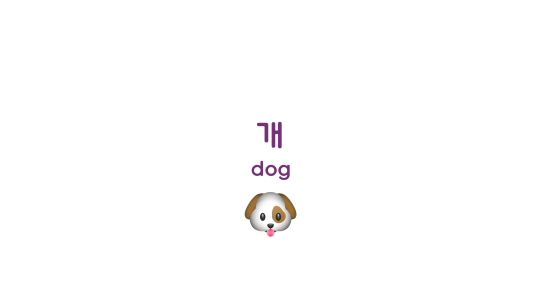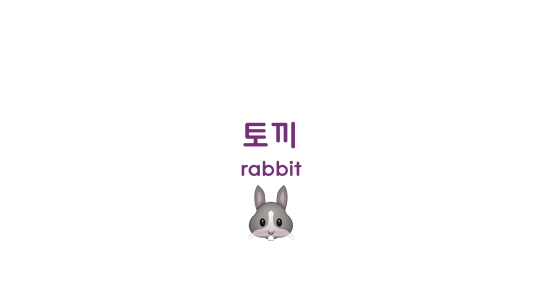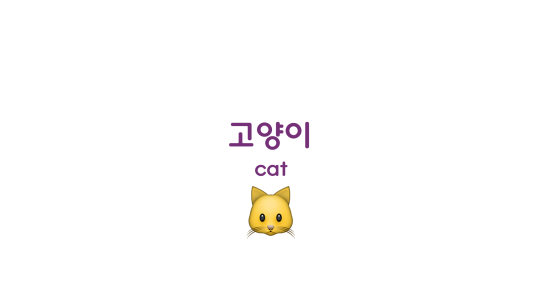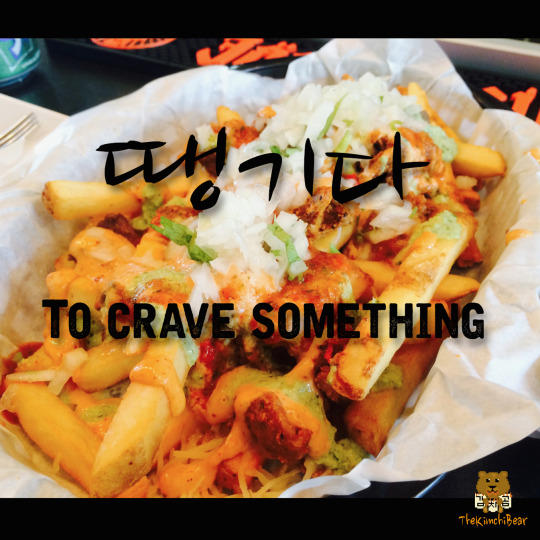Photo






Here are 6 animal names for beginners! I love hedgehogs (고슴도치), deers (사슴) and chicks (병아리) 🦔🦌🐣
Learn Korean vocabulary on my YouTube channel!
68 notes
·
View notes
Text
Korean Through Games: Hongsam (홍삼)

This game (like a lot of Korean games) is played with the same beat as the Frying Pan game (lap clap right thumb left thumb)
*see gif below*

Intro:
아싸 홍삼 에브리바디 홍삼! 🎵
아 lap 싸 clap 홍 right 삼 left 에브리 lap 바디 clap 홍 right 삼 left
아싸 | assa (general cheer)
홍삼 | red ginseng
에브리바디 | Korean pronunciation of everybody
Rules:
첫 번째로 시작한 사람은 “아싸~ 너! 너!” 라고 외치며 두 사람을 지목합니다
The first person to start yells, “Assa~ you! You!” and picks two people

지목을 당한 두 사람은 “아싸~ 너!”라고 외치며 각자 한 명씩 다른 사람을 선택합니다. 속도가 빠를수록 게임의 난이도는 높아지니 스피드를 점점 UP 시켜주세요~!
Those two chosen people yell, “Assa~ you!” and each choose a person. The faster the speed, the higher the level of difficulty, so slowly speed up how fast you go!

서로 다른 사람을 지목하다 두 사람이 한 사람을 동시에 지목했다면 지목 당한 사람이 “아싸~ 홍삼~!” 이라고 말하며 자신만의 제스처를 보여줍니다. 그럼 다른 사람들도 모두 함께 “에브리바디~ 홍삼~!” 이라고 외치며 제스처를 따라 해야 합니다.
If the two people both pick the same person, the chosen person has to say, “Assa hongsam!” while doing a gesture of their choosing. And everyone else has to follow by responding with “everybody hongsam!”

그리고 지목을 받은 사람이 다시 처음으로 돌아가 “아싸~ 너! 너!” 라고 외치며 두 명을 지목합니다.
And the person who was chosen has to start over from the beginning with, “Assa~ you! You!” and pick two people.

*you lose by not responding/choosing someone after being pointed at. ( basically if you miss your turn, you lose)*
Loser usually has to drink or receive some type of punishment

Vocab:
외치다 | to yell/call out
지목하다 | to pick
선택하다 | to choose
따르다 | to follow
속도 | speed
난이도 | level of difficulty
377 notes
·
View notes
Text
Free Online Language Courses

Here is a masterpost of MOOCs (massive open online courses) that are available, archived, or starting soon. I think they will help those that like to learn with a teacher or with videos. You can always check the audit course or no certificate option so that you can learn for free.
American Sign Language
ASL University
Arabic
Arabic for Global Exchange (in the drop down menu)
Arabic Without Walls
Intro to Arabic
Madinah Arabic
Moroccan Arabic
Catalan Sign Language
Intro to Catalan Sign Language
Chinese
Beginner
Basic Chinese
Basic Chinese I. II, III, IV , V
Basic Mandarin Chinese I & II
Beginner’s Chinese
Chinese for Beginners
Chinese Characters
Chinese for HSK 1
First Year Chinese I & II
HSK Level 1
Mandarin Chinese I
Mandarin Chinese for Business
More Chinese for Beginners
Start Talking Mandarin Chinese
UT Gateway to Chinese
Chino Básico (Taught in Spanish)
Intermediate
Chinese Stories
Intermediate Business Chinese
Intermediate Chinese Grammar
Dutch
Introduction to Dutch
English
Online Courses here
Resources Here
Faroese
Faroese Course
Finnish
A Taste of Finnish
Basic Finnish
Finnish for Immigrants
Finnish for Medical Professionals
French
Beginner
AP French Language and Culture
Basic French Skills
Beginner’s French: Food & Drink
Diploma in French
Elementary French I & II
Français Interactif
French in Action
French for Beginners
French Language Studies I, II, III
French:Ouverture
Intermediate & Advanced
French: Le Quatorze Juillet
Passe Partout
La Cité des Sciences et de Industrie
Frisian
Introduction to Frisian (Taught in English)
Introduction to Frisian (Taught in Dutch)
German
Beginner
Beginner’s German: Food & Drink
Conversational German I, II, III, IV
Deutsch im Blick
Diploma in German
Rundblick-Beginner’s German
Advanced
German:Regionen Traditionen und Geschichte
Landschaftliche Vielfalt
Hebrew
Biblical Hebrew
Know the Hebrew Alphabet
Teach Me Hebrew
Hindi
A Door into Hindi
Business Hindi
Virtual Hindi
Icelandic
Icelandic 1-5
Indonesian
Learn Indonesian
Irish
Introduction to Irish
Italian
Beginner
Beginner’s Italian: Food & Drink
Beginner’s Italian I
Introduction to Italian
Italian for Beginners 1 , 2, 3 , 4 , 5, 6
Intermediate & Advaned
Intermediate Italian I
Advanced Italian I
La Commedia di Dante
Japanese
Genki
Japanese JOSHU
Japanese Pronunciation
Sing and Learn Japanese
Tufs JpLang
Kazakh
A1-B2 Kazakh (Taught in Russian)
Korean
Beginner
First Step Korean
How to Study Korean
Learn to Speak Korean
Pathway to Spoken Korean
Intermediate
Intermediate Korean
Nepali
Beginner’s Conversation and Grammar
Norwegian
Introduction to Norwegian
Norwegian on the Web
Portuguese
Curso de Português para Estrangeiros
Pluralidades em Português Brasileiro
Russian
Beginner
Easy Accelerated Learning for Russian
Advanced
Reading Master and Margarita
Russian as an Instrument of Communication
Siberia: Russian for Foreigners
Spanish
Beginner
AP Spanish Language & Culture
Basic Spanish for English Speakers
Beginner’s Spanish:Food & Drink
Fastbreak Spanish
Introduction to Spanish
Restaurants and Dining Out
Spanish for Beginners
Spanish for Beginners 1, 2, 3, 4, 5, 6
Spanish Vocabulary
Intermediate
Spanish:Ciudades con Historia
Spanish:Espacios Públicos
Advanced
Corrección, Estilo y Variaciones
Leer a Macondo
Spanish:Con Mis Propias Manos
Spanish: Perspectivas Porteñas
Swedish
Intro to Swedish
Swedish Made Easy 1, 2, & 3
Ukrainian
Read Ukrainian
Ukrainian Language for Beginners
Welsh
Beginner’s Welsh
Discovering Wales
Multiple Languages
Ancient Languages
More Language Learning Resources & Websites!
Last updated: March 1, 2017
214K notes
·
View notes
Text
Multiple Language Learning Methods: One Isn’t Going to Cut It
Hi guys! Thank you for your patience as I get adjusted in China and try to find time to update my studyblr! Between studying my languages and teaching, it’s been a bit of a struggle. But I’ve finally got situated enough to get on Tumblr and get to work on a new post that I’m excited to finally share with you!
How many methods do you use to study languages? If you say one, you’re probably studying wrong. When you were in grade school studying the alphabet, did you just read a textbook and BAM you knew the alphabet? OF COURSE NOT! As much as our parents and instructors would wish we did learn that easily, no one ever does! No one. The best way to learn something is to experience it in different ways, situations and formats. You listened to the alphabet spoken in class by your teacher, then by an audio cd, then on tv when you watched Sesame Street, then in a song at a babysitters house, then read them in a textbook, then maybe played computer games to help you practice on top of all that. You heard the same alphabet over and over in different contexts. I used to be a big fan of Between the Lions back in the day because they would teach you a letter then a few words, then use those words and letters over and over again in different skits during the show. If the word of the day was dig, then in the cartoon Cliff Hanger, Cliff would need to spell dig to figure out how to come down from the cliff (of course it never worked, but that’s besides the point), there would be a song with dig in it, there would be activities where you’d have to insert the missing letters, and then the lions themselves would get into situation where they would need to dig something and you’d learn the word dig AGAIN. You get the point. This stuff isn’t just for children. This stuff is gold for language learning as adults, so how do you tap into this knowledge? By giving yourself multiple methods of language study just like a kid! By creating multiple methods of language studying, you are cementing everything you have learned into your memory. With this in mind, you must always have at least three methods of study to pull out when you study every week. Here are mine:
Video/Audio lesson method (example: video based lessons, Youtube video lessons, TTMIK)
1. Watch/listen to video/audio lesson once all the way through (just listen and repeat)
2. Re-watch while writing down new vocabulary (listening writing)
3. Study new vocabulary (reading)
Write out and use a joke or story to remember each word
Look for examples of uses for words using videos or songs or something (Listening) (speaking)
(if learning Korean, use Naver. If learning Chinese or Japanese use Fluent U to search for videos, commercials, music videos, and episodes of shows containing your vocab word. For everything else just search Youtube)
Write out each word ten times (writing)
4. Re-watch video/audio (Listening)
5. Repeat after video/audio (Speaking)
6. Study vocab again at end of the week
Textbook method
Tip: If you buy a textbook for self study, definitely get one with audio
1. Read textbook lesson with audio if included (reading) (listening)
2. Read lesson without audio
2. Study vocabulary (reading)
Make and write a joke or saying or story to help you remember each word (Exam
4. Look for examples of uses for words using videos or songs or something (listening) (speaking)
5. Write character out ten times each (writing)
6. Repeat after audio if included (speaking)
Vocab lists (example: Tumblr, Pinterest, etc)
Say you find a list of interesting vocabulary on Tumblr or Pinterest. You can plan to use this during the week!
1. Read vocab list (reading)
2. Find corresponding audio and repeat. You can use a dictionary audio (listening) (speaking)
3. Study vocab words (reading)
Make jokes or some story to help you remember
5. Look for examples of uses for words using videos or songs or something (reading) (speaking)
6. Repeat after audio (speaking)
Shows, Movies, Youtube Videos
1. Watch video 10 minutes at a time (listening) (DO NOT watch the whole thing unless it is short)
2. Study vocab and grammar (reading) (writing)
3. Make inside jokes or story to help remember vocabulary
4. Look for examples of uses for words using videos or songs or something (listening) (speaking)
5. Write vocab out 10 times (writing)
6. Make any relevant notes about culture and usage
7. Repeat after video sentences (speaking)
This method takes a long time over a course of weeks to finish a movie.
Music and Songs
1. Listen to entire song without looking at lyrics (listening)
2. Go find lyrics and study vocabulary line by line (reading)
3. Make jokes or a story to remember vocabulary
4. No need to look for examples of word usage if you don’t want to
5. Write out vocabulary 10 times
6. Stop studying after one paragraph or verse
7. Read the lyrics
8. Listen to the song and try to follow along
9. Do this until you learn the whole song
8. Make any cultural notes
Okay, so let me explain some details in the post. In every method, one of the steps is to make a joke or some kind of phrase to help you memorize a new vocabulary word. Let me explain. Sometimes it is very hard to remember vocabulary words unless there is a story behind them! Say your words is 苹果 (apple) so you write the English translation and then below it you write, “Sarah refuses to eat her 苹果 and has now tossed it onto the floor. Sarah is 24.” Now you’ve written a short and memorable story about apples and are more likely to remember the word 苹果 . Got it? They teach this stuff in kindergarten and now you’re going to do it for you!
Note: If you are learning Chinese, you can use the radicals to make a story if you’d like. But that would require learning the radicals for every single word, which I encourage you to do anyway, but you don’t have to.
So how do you plan these into your weekly schedule? Easy! Pick a method and do that for one week and then change it to something else the next week. Or you can change it everyday or every few days. I will talk about it more in another post!
Thank you for reading! I hope this was helpful!
8K notes
·
View notes
Text
Korean Grammar -(으)ㄹ 만하다 - worth doing

Notes - 메모
Like often in Korean it’s important to pay attention to the context, to get the right meaning. But don’t worry, this one is a really simple pattern and quite easy to use. After going through these lines you will be able to say that something is worth doing/going/seeing etc. In this case and for this meaning you have to use action verbs. It also can indicate that even though the speaker is not totally satisfied, something is still worth doing, bearable or acceptable to do. So, when you say 이 음식은 먹어 볼 만해요. you can say that this food is delicious, therefore worth trying to eat OR that this Food is not the best but still ok to taste.
When using -(으)ㄹ 만하다 with descriptive verbs you get a slightly different meaning. Then you can translate this like that it’s natural and understandable that something is like the way it is.
You will often find the pattern -아/어/여 보다 (to try doing something) in combination with (으)ㄹ 만하다.
Since 만하다 is a descriptive verb in this pattern, the thing you describe as worth doing or acceptable needs either a topic or subject marker. (은/는/이/가). When you recommend a place you don’t use the location particle 에.
Grammar - 문법
• Verb stems ending with a consonant + -을 만하다
• Verb stems ending with a vowel + -ㄹ 만하다
Sample sentences / 보기
밥은 먹을 만해? Is it worth eating? Does it taste ok/good?
볼 만한 영화를 추천해 주세요. Please recommend a movie that is worth watching. / Please recommend a movie to watch.
그 한국식당 비빔밥은 먹어 볼 만해요. The Korean restaurant’s Bibimbap is worth trying (to eat).
한국어는 공부할 만해요. Korean is worth studying.
서울은 갈 만해요. It’s worth going to Seoul.
이 영화는 볼 만한 거 같아요. I think this movie is worth watching.
지금 피곤할 만해요. It’s natural that I am/you are tired now.
그 책 재미있어요? 별로 재미없지만 한 번 읽어 볼 만해요. Is that book interesting? The book is not that interesting but it’s still worth reading once.

resources: Talk To Me In Korean, How to study Korean, different blogs and online resources, youtube, Praktische Grammatik der koreanischen Sprache
Disclaimer: I’m not a native Korean speaker. I learn Korean by myself. If there are any mistakes please let me know so I can correct it. 감사합니다!
550 notes
·
View notes
Text
EAT UP.. non-edible verbs
We all know that a huge part of Korean culture is.. eating! However the word 먹다 (to eat) has several different uses in Korean, and if you don’t know these terms.. you may be a bit confused like when you hear “친구 먹었어".. please don’t eat my friend?
Let’s take a look!
까먹다 - to forget
“너 수학 숙제 했어? 오늘까지인거 알지?” - “You did your homework right? You know it’s due today.”
“아.. 까먹었어..” - “Ah.. I forgot..”
더위 먹다 - to be overwhelmed by heat
“더위 먹어서 정신이 없나봐요. 아이스 커피 4잔 산다는게 3잔 샀어요.. 죄송합니다” - “I was so overheated that I couldn’t think straight.. I bought 3 iced coffees instead of 4… I’m so sorry”
나이 먹다 - to get older
“아이고.. 나이 먹나봐. 허리 아파..” - “Ohh god.. I’m getting so old.. My back hurts..”
“너 19살인데..” - “You’re only 19..”
욕 먹다 - to be sworn at or get a bad reputation.
“요즘 그 아이돌 거짓말한거 걸려서 욕 많이 먹더라.“ - “Everyone found out that the idol lied so his reputation is getting ruined.”
좀먹다 - to undermine, eat away
“그런 사람들이 사회를 좀먹는거 같아요." “Because of people like that, society is being eaten away.”
친구 먹다 - to become friends
“우리 3살차이 나는데 그냥 친구 먹기로 했어.” - “We’re only 3 years apart but we decided to be friends” (BTW: generally only people the same age are considered to be “친구/friends”. If there’s an age difference, then one person will be considered the “친한 동생/younger sibling” in the relationship)
써먹다 - to use, utilize
“그 농담 재밌다. 나도 나중에 써먹어야지.” - “That’s a funny joke. I’ll have to use it later.”
I hope these terms were tasty enough for you to eat right up. More coming soon!
3K notes
·
View notes
Text
#12 - Michi means ''crazy''
(suggested by http://toramizu77.tumblr.com/)
7 notes
·
View notes
Text
#4 - Nu ABO means a ''new type of blood'', a ''new type of person''. Nu = new, ABO = the blood types.
22 notes
·
View notes
Text
줄임말 (Slang Part 3: Getting Conversational)
So you know the basics of Korean texting slang.. but now you want more.. right? Let’s play with some new words that aren’t just shortened versions, here’s some common conversational slang for you to use.
콜 - to be down, sounds good (can be question or answer)
“치맥 콜?” = “You down to get some chicken and beer?”
~각 – feels like
“오늘 비도 오니까 막걸리각인데.. 막걸리 콜?” = “I’m feeling makgoli today cause it’s raining, down for some makgoli?”
“한조에 겐지까지 있으면 질각인데” = “We have both Hanzo and Genji.. feels like we’re gonna lose.”
갓~ / ~느님 - God / Someone fantastic
3 pop culture gods of Korea
“갓연아” - Yuna Kim (figure skater)
“유느님” - Jaesok Yu (TV MC)
“치느님” - Fried Chicken (who doesn’t love it?)
그린라이트 - Green light to move in (only romantically)
“어제 좋아하는 남자애가 우산 씌워줬는데, 이거 혹시 그린라이트야?” = “Yesterday the guy I like held an umbrella for me, is that the green light?”
빵터지다 - Bust out laughing (빵 = sound, 터지다 = explode), LOL
“가디언즈 오브 갤러시 2에서 메리 포핀스 대사에서 진짜 빵터졌잖아.” = “I busted out laughing at the Mary Poppins line in Guardians of the Galaxy 2.”
빡세다 - Something difficult
“카페에서 알바하는데 생각보다 빡세더라.” = “Working at a cafe is so much harder than I thought.”
흑역사 - Dark past / embarrassing moment
“마이스페이스에 올린 사진들 미친거 같아, 내 흑역사야 진짜.” = “I can’t believe my old myspace pictures, that was a dark period in my life…”
“나 오늘 스마트폰 보고 가다가 넘어져가지고 또 흑역사 하나 생성하고 왔잖아…” = “I had the most embarrassing moment today.. I fell down because I was watching my phone…”
오그라든다 - Cringey
“너가 한 아재개그때문에 오그라들었어..“ = “Your dad joke was so cringey..”
5K notes
·
View notes
Text
줄임말 (Slang Part 2: Internet Friends)
So you’re still texting those Korean friends and you’re comfortable now, let’s get a little bit lazy. To write as fast as possible in Korean you gotta use those consonants (except ㅗ), LETS GO!
ㄱㅊ - 괜찮(괜찮아) > It’s okay
ㄱㄷ - 기달(기다려) > Wait
ㄱㅇㄷ - 개이득 > F***ing lucky / SCORE
ㄱㄱ / ㄱㄱㅅ - 고고/고고싱 > Go Go
ㄴㄴ - 노노 > No no
ㅇㄱㄹㅇ / 일겅 - 이거레알 > Too true (this is real)
ㅇㅈ - 인정 > Right / Definitely (often both a question and answer)
ㅊㅋ - 추카(축하해) > Congratulations
ㄷㄷ - 덜덜 > Shiver
ㅇㅇ - 응응 > Yep yep
ㅂㅂ - 바이바이 > Bye bye
ㅁㅊ - 미친 > Crazy
ㅇㄷ - 어디 > Where are you?
ㅇㅎ - 아하 > A-ha!
ㅗ - 엿먹어 > Middle finger
ㅎㅇ - 하이 > Hai (hi)
ㅈㄲ - 잠깐 (잠깐만) > Wait
ㄱㅅ - 감사 (감사합니다/고마워) > Thanks
ㅇㅋㅇㅋ > Ok ok! (agreeing excitedly)
Hopefully this helps with those rushed texts, or maybe now you can understand those rapid fire messages in Overwatch (that’s my real reason.)
More to come soon!
3K notes
·
View notes
Text
Less is more (slang / 줄임말 pt. 1)
So you took some Korean classes, and you finally start texting someone in Korean! Yet you still have no idea what they’re saying cause it’s nothing like the textbooks… Let’s solve that!
Here are some of the basics:
아무튼 - 암튼 (anyways, in any case)
그냥 - 걍 (just)
처음 - 첨 (first)
너무 - 넘 (very/too much)
제일 - 젤 (most)
내일 - 낼 (tomorrow)
요일 - 욜 (day)
월욜/화욜/수욜 (Mon, Tues, Wed…)
시험 - 셤 (test)
마음 - 맘 (mind, heart)
모르겠다 - 몰겠다 (don’t know)
다음 - 담 (next)
아니면 - 아님 (if not)
드디어 - 드뎌 (finally)
지하철 - 쟈철 (subway)
왤케 - 왜 이렇게 (why are/is/am you/it/I being like this?)
Slang comes and goes really quickly in Korea, but these one’s aren’t trendy words - just shortened forms of daily words. I’ll post more if there’s interest; let me know if you have any specific subjects or terms you’re curious about!
2K notes
·
View notes
Text
Daily Phrases
장난아냐(아니야) - No joke / not kidding
[장난 - Joke]
정신 차려 - Get a grip / keep it together
[정신 - Mind, Spirit, Soul]
26 notes
·
View notes
Text
Words you don’t want to hear
지겹다 - To be tired / sick of something
지루하다 - To be bored of something
짜증나다 - To be frustrating / annoying

25 notes
·
View notes
Text
꿀!
꿀 - Honey
꿀 is also slang for sweet or awesome when added to things
꿀맛 - tastes great!
꿀잼 - something that’s sweet or interesting
꿀잠 - sleeping really well
꿀이야 - that’s sweet
ex. 이 수업 시험 없데, 꿀이네? - This class has no tests, sweet right?
41 notes
·
View notes


